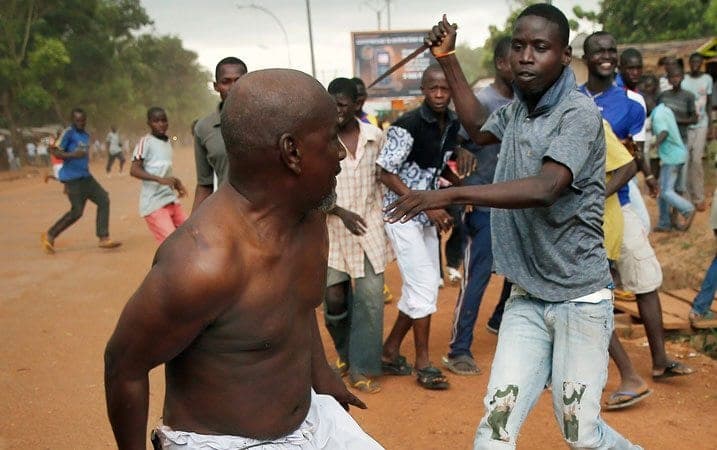ROME – United Nations forces retook strategic areas of a city in the Central African Republic on Monday after an attack by Christian rebels during the weekend, which killed nearly 30 Muslim civilians and a Moroccan peacekeeper at a nearby U.N. base.
The weekend attacks by more than 700 Christian anti-Balaka rebels in the Muslim district of Tokoyo in Bangassou displaced thousand of residents. Some locked themselves in their homes for safety, or fled in search of sanctuary.
According to humanitarian agencies, more than 1,000 people took refuge in a mosque in Bangassou on the Congolese border, as well as 1,500 in a cathedral and 500 more in a hospital, in an effort to escape the carnage.
On Monday, U.N. forces managed to free the area around the mosque securing an escape for those who were hiding inside, according to U.N. mission spokesman Herve Verhoosel.
The attacks seemed to be aimed at Muslims in the region, according to U.N. officials, and may be a sign that the religious and civil tensions that have been plaguing the Central African Republic for more than a decade may be reaching a tipping point.
Cardinal Dieudonne Nzapalainga of Bangui, the youngest cardinal in the Church and the first from the country, championed an effort to initiate peace negotiations with the rebels on Sunday, local news agencies report.
In the Central African Republic as in many other nations in Africa, the Catholic Church is often a trusted advisor in conflict resolution efforts.
Le Cardinal Dieudonné Nzapalaïnga dans la région de Bangassou au chevet de la population. pic.twitter.com/4S3DPYgcDh
— Antoinette MONTAIGNE (@Banzekaa) May 13, 2017
During a pastoral mission in the area on May 12, Nzapalainga called armed forces to lay down their arms and met with representatives from various fronts to listen to their demands.
Local news agencies report that the rebels were willing to call a ceasefire and write their complaints in a letter to the government.
But according to Local Red Cross President Pastor Antoine Mbao Bogo, gunfire continued throughout the night on Sunday preventing humanitarian organizations from intervening to help the wounded and recover the dead.
The president of CAR, Faustin Archange Touadera, said on Sunday that “Central African Republic will never be left in the hands of these sowers of death.”
Touadera reassured citizens that justice would be sought and called rebel leaders to “stop this blind and unjustified violence.”
The U.N.’s intervention comes as the conflict has been reaching a climax. Early in May, five U.N. peacekeepers were killed and dozens of civilians fell victim to sectarian violence.
The conflict in the country started in March 2013 after Christian President François Bozizé was overthrown during the Civil War by a mostly-Muslim rebel coalition known as Séléka. To this day violence ensues in areas outside government control.
Thousands have died as a result of the conflict and over a million people have been internally displaced as a result of the conflict in what was already the world’s third poorest country.
The country is 80 percent Christian and 15 percent Muslim, and religious hatred often fuels conflict. Partly for this reason, Pope Francis chose the CAR to open the first Holy Door for the Jubilee of Mercy in 2016 during his trip to the country and preached forgiveness.
At the time, optimism inspired by the papal visit was credited with creating a climate in which a peaceful transfer of power was possible. The reigniting of the conflict, however, offers a reminder of how fragile any temporary peace in the country remains.















